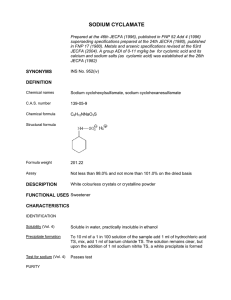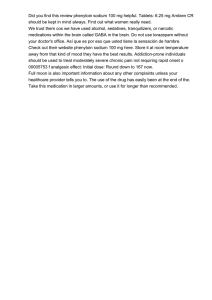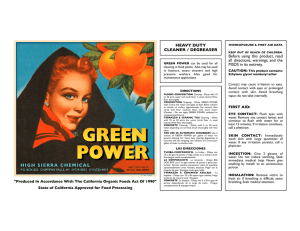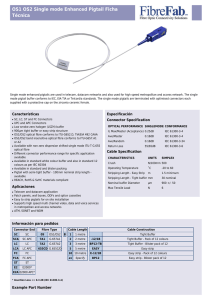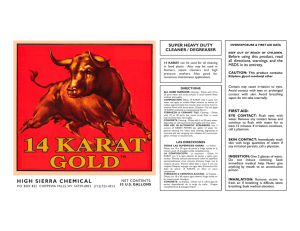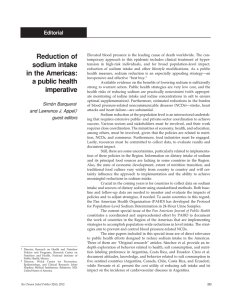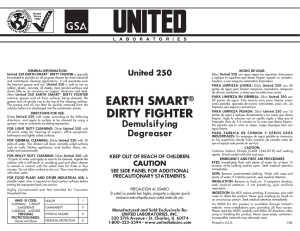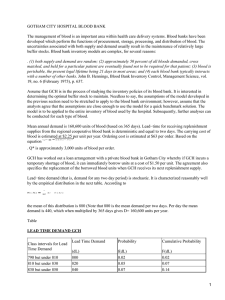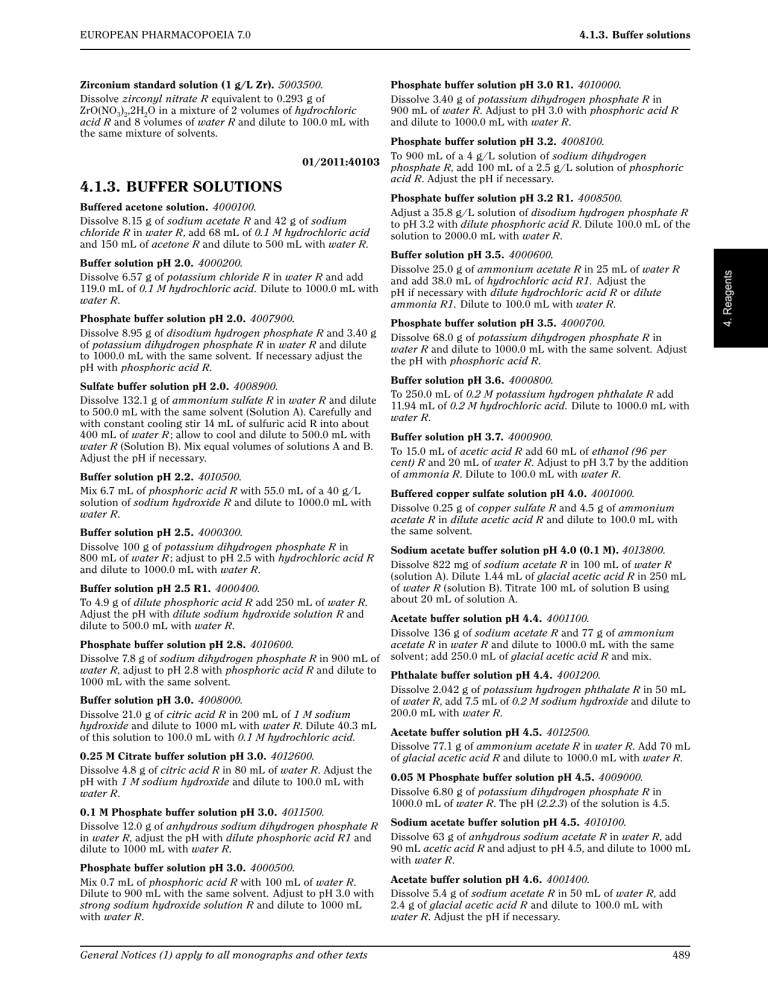
4.1.3. Buffer solutions EUROPEAN PHARMACOPOEIA 7.0 Zirconium standard solution (1 g/L Zr). 5003500. Dissolve zirconyl nitrate R equivalent to 0.293 g of ZrO(NO3)2,2H2O in a mixture of 2 volumes of hydrochloric acid R and 8 volumes of water R and dilute to 100.0 mL with the same mixture of solvents. 4.1.3. BUFFER SOLUTIONS Phosphate buffer solution pH 3.0 R1. 4010000. Dissolve 3.40 g of potassium dihydrogen phosphate R in 900 mL of water R. Adjust to pH 3.0 with phosphoric acid R and dilute to 1000.0 mL with water R. Phosphate buffer solution pH 3.2. 4008100. To 900 mL of a 4 g/L solution of sodium dihydrogen 01/2011:40103 phosphate R, add 100 mL of a 2.5 g/L solution of phosphoric acid R. Adjust the pH if necessary. Buffered acetone solution. 4000100. Dissolve 8.15 g of sodium acetate R and 42 g of sodium chloride R in water R, add 68 mL of 0.1 M hydrochloric acid and 150 mL of acetone R and dilute to 500 mL with water R. Phosphate buffer solution pH 3.2 R1. 4008500. Adjust a 35.8 g/L solution of disodium hydrogen phosphate R to pH 3.2 with dilute phosphoric acid R. Dilute 100.0 mL of the solution to 2000.0 mL with water R. Buffer solution pH 2.0. 4000200. Dissolve 6.57 g of potassium chloride R in water R and add 119.0 mL of 0.1 M hydrochloric acid. Dilute to 1000.0 mL with water R. Buffer solution pH 3.5. 4000600. Dissolve 25.0 g of ammonium acetate R in 25 mL of water R and add 38.0 mL of hydrochloric acid R1. Adjust the pH if necessary with dilute hydrochloric acid R or dilute ammonia R1. Dilute to 100.0 mL with water R. Phosphate buffer solution pH 2.0. 4007900. Dissolve 8.95 g of disodium hydrogen phosphate R and 3.40 g of potassium dihydrogen phosphate R in water R and dilute to 1000.0 mL with the same solvent. If necessary adjust the pH with phosphoric acid R. Phosphate buffer solution pH 3.5. 4000700. Dissolve 68.0 g of potassium dihydrogen phosphate R in water R and dilute to 1000.0 mL with the same solvent. Adjust the pH with phosphoric acid R. Sulfate buffer solution pH 2.0. 4008900. Dissolve 132.1 g of ammonium sulfate R in water R and dilute to 500.0 mL with the same solvent (Solution A). Carefully and with constant cooling stir 14 mL of sulfuric acid R into about 400 mL of water R ; allow to cool and dilute to 500.0 mL with water R (Solution B). Mix equal volumes of solutions A and B. Adjust the pH if necessary. Buffer solution pH 2.2. 4010500. Mix 6.7 mL of phosphoric acid R with 55.0 mL of a 40 g/L solution of sodium hydroxide R and dilute to 1000.0 mL with water R. Buffer solution pH 2.5. 4000300. Dissolve 100 g of potassium dihydrogen phosphate R in 800 mL of water R ; adjust to pH 2.5 with hydrochloric acid R and dilute to 1000.0 mL with water R. Buffer solution pH 2.5 R1. 4000400. To 4.9 g of dilute phosphoric acid R add 250 mL of water R. Adjust the pH with dilute sodium hydroxide solution R and dilute to 500.0 mL with water R. Buffer solution pH 3.6. 4000800. To 250.0 mL of 0.2 M potassium hydrogen phthalate R add 11.94 mL of 0.2 M hydrochloric acid. Dilute to 1000.0 mL with water R. Buffer solution pH 3.7. 4000900. To 15.0 mL of acetic acid R add 60 mL of ethanol (96 per cent) R and 20 mL of water R. Adjust to pH 3.7 by the addition of ammonia R. Dilute to 100.0 mL with water R. Buffered copper sulfate solution pH 4.0. 4001000. Dissolve 0.25 g of copper sulfate R and 4.5 g of ammonium acetate R in dilute acetic acid R and dilute to 100.0 mL with the same solvent. Sodium acetate buffer solution pH 4.0 (0.1 M). 4013800. Dissolve 822 mg of sodium acetate R in 100 mL of water R (solution A). Dilute 1.44 mL of glacial acetic acid R in 250 mL of water R (solution B). Titrate 100 mL of solution B using about 20 mL of solution A. Acetate buffer solution pH 4.4. 4001100. Dissolve 136 g of sodium acetate R and 77 g of ammonium acetate R in water R and dilute to 1000.0 mL with the same Phosphate buffer solution pH 2.8. 4010600. Dissolve 7.8 g of sodium dihydrogen phosphate R in 900 mL of solvent ; add 250.0 mL of glacial acetic acid R and mix. water R, adjust to pH 2.8 with phosphoric acid R and dilute to Phthalate buffer solution pH 4.4. 4001200. 1000 mL with the same solvent. Dissolve 2.042 g of potassium hydrogen phthalate R in 50 mL Buffer solution pH 3.0. 4008000. of water R, add 7.5 mL of 0.2 M sodium hydroxide and dilute to 200.0 mL with water R. Dissolve 21.0 g of citric acid R in 200 mL of 1 M sodium hydroxide and dilute to 1000 mL with water R. Dilute 40.3 mL Acetate buffer solution pH 4.5. 4012500. of this solution to 100.0 mL with 0.1 M hydrochloric acid. Dissolve 77.1 g of ammonium acetate R in water R. Add 70 mL 0.25 M Citrate buffer solution pH 3.0. 4012600. of glacial acetic acid R and dilute to 1000.0 mL with water R. Dissolve 4.8 g of citric acid R in 80 mL of water R. Adjust the 0.05 M Phosphate buffer solution pH 4.5. 4009000. pH with 1 M sodium hydroxide and dilute to 100.0 mL with Dissolve 6.80 g of potassium dihydrogen phosphate R in water R. 1000.0 mL of water R. The pH (2.2.3) of the solution is 4.5. 0.1 M Phosphate buffer solution pH 3.0. 4011500. Dissolve 12.0 g of anhydrous sodium dihydrogen phosphate R Sodium acetate buffer solution pH 4.5. 4010100. Dissolve 63 g of anhydrous sodium acetate R in water R, add in water R, adjust the pH with dilute phosphoric acid R1 and 90 mL acetic acid R and adjust to pH 4.5, and dilute to 1000 mL dilute to 1000 mL with water R. with water R. Phosphate buffer solution pH 3.0. 4000500. Acetate buffer solution pH 4.6. 4001400. Mix 0.7 mL of phosphoric acid R with 100 mL of water R. Dilute to 900 mL with the same solvent. Adjust to pH 3.0 with Dissolve 5.4 g of sodium acetate R in 50 mL of water R, add 2.4 g of glacial acetic acid R and dilute to 100.0 mL with strong sodium hydroxide solution R and dilute to 1000 mL water R. Adjust the pH if necessary. with water R. General Notices (1) apply to all monographs and other texts 489 4.1.3. Buffer solutions EUROPEAN PHARMACOPOEIA 7.0 Succinate buffer solution pH 4.6. 4001500. Disssolve 11.8 g of succinic acid R in a mixture of 600 mL of water R and 82 mL of 1 M sodium hydroxide and dilute to 1000.0 mL with water R. Phosphate buffer solution pH 5.8. 4002100. Dissolve 1.19 g of disodium hydrogen phosphate dihydrate R and 8.25 g of potassium dihydrogen phosphate R in water R and dilute to 1000.0 mL with the same solvent. Acetate buffer solution pH 4.7. 4001600. Dissolve 136.1 g of sodium acetate R in 500 mL of water R. Mix 250 mL of this solution with 250 mL of dilute acetic acid R. Shake twice with a freshly prepared, filtered, 0.1 g/L solution of dithizone R in chloroform R. Shake with carbon tetrachloride R until the extract is colourless. Filter the aqueous layer to remove traces of carbon tetrachloride. Acetate buffer solution pH 6.0. 4002200. Dissolve 100 g of ammonium acetate R in 300 mL of water R, add 4.1 mL of glacial acetic acid R, adjust the pH if necessary using ammonia R or acetic acid R and dilute to 500.0 mL with water R. Citrate buffer solution pH 5.0. 4010700. Prepare a solution containing 20.1 g/L of citric acid R and 8.0 g/L of sodium hydroxide R. Adjust the pH with dilute hydrochloric acid R. Phosphate buffer solution pH 6.0 R1. 4002500. Dissolve 6.8 g of sodium dihydrogen phosphate R in water R and dilute to 1000.0 mL with water R. Adjust the pH with strong sodium hydroxide solution R. Phosphate buffer solution pH 5.0. 4011300. Dissolve 2.72 g of potassium dihydrogen phosphate R in 800 mL of water R. Adjust the pH with 1 M potassium hydroxide and dilute to 1000 mL with water R. Phosphate buffer solution pH 6.0 R2. 4002600. To 250.0 mL of 0.2 M potassium dihydrogen phosphate R add 28.5 mL of 0.2 M sodium hydroxide and dilute to 1000.0 mL with water R. Buffer solution pH 5.2. 4001700. Dissolve 1.02 g of potassium hydrogen phthalate R in 30.0 mL of 0.1 M sodium hydroxide. Dilute to 100.0 mL with water R. Phosphate buffer solution pH 6.4. 4002800. Dissolve 2.5 g of disodium hydrogen phosphate R, 2.5 g of sodium dihydrogen phosphate R and 8.2 g of sodium chloride R in 950 mL of water R. Adjust the pH of the solution to 6.4 with 1 M sodium hydroxide or 1 M hydrochloric acid, if necessary. Dilute to 1000.0 mL with water R. Diethylammonium phosphate buffer solution pH 6.0. 4002300. Acetate buffer solution pH 4.7 R1. 4013600. Dissolve 136.1 g of sodium acetate R in 500 mL of water R. Mix Dilute 68 mL of phosphoric acid R to 500 mL with water R. To 25 mL of this solution add 450 mL of water R and 6 mL 250 mL of this solution with 250 mL of dilute acetic acid R. of diethylamine R, adjust to pH 6 ± 0.05, if necessary, using diethylamine R or phosphoric acid R and dilute to 500.0 mL Acetate buffer solution pH 5.0. 4009100. with water R. To 120 mL of a 6 g/L solution of glacial acetic acid R add 100 mL of 0.1 M potassium hydroxide and about 250 mL of Phosphate buffer solution pH 6.0. 4002400. water R. Mix. Adjust the pH to 5.0 with a 6 g/L solution of acetic acid R or with 0.1 M potassium hydroxide and dilute to Mix 63.2 mL of a 71.5 g/L solution of disodium hydrogen phosphate R and 36.8 mL of a 21 g/L solution of citric acid R. 1000.0 mL with water R. 0.067 M Phosphate buffer solution pH 5.4. 4012000. Mix appropriate volumes of a 23.99 g/L solution of disodium hydrogen phosphate R with a 9.12 g/L solution of sodium dihydrogen phosphate monohydrate R to obtain pH 5.4 (2.2.3). Acetate-edetate buffer solution pH 5.5. 4001900. Dissolve 250 g of ammonium acetate R and 15 g sodium edetate R in 400 mL of water R and add 125 mL of glacial acetic acid R. Buffer solution pH 5.5. 4001800. Dissolve 54.4 g of sodium acetate R in 50 mL of water R, heating to 35 °C if necessary. After cooling, slowly add 10 mL of anhydrous acetic acid R. Shake and dilute to 100.0 mL with water R. Phosphate buffer solution pH 5.5. 4002000. Dissolve 13.61 g of potassium dihydrogen phosphate R in water R and dilute to 1000.0 mL with the same solvent (solution A). Dissolve 35.81 g of disodium hydrogen phosphate R in water R and dilute to 1000.0 mL with the same solvent (solution B). Mix 96.4 mL of solution A and 3.6 mL of solution B. Phosphate-citrate buffer solution pH 5.5. 4008700. Mix 56.85 mL of a 28.4 g/L solution of anhydrous disodium hydrogen phosphate R and 43.15 mL of a 21 g/L solution of citric acid R. Phosphate buffer solution pH 5.6. 4011200. Dissolve 0.908 g of potassium dihydrogen phosphate R in water R and dilute to 100.0 mL with the same solvent (solution A). Dissolve 1.161 g of dipotassium hydrogen phosphate R in water R and dilute to 100.0 mL with the same solvent (solution B). Mix 94.4 mL of solution A and 5.6 mL of solution B. If necessary, adjust to pH 5.6 using solution A or solution B. 490 0.5 M Phthalate buffer solution pH 6.4. 4009200. Dissolve 100 g of potassium hydrogen phthalate R in water R and dilute to 1000.0 mL with the same solvent. Adjust the pH if necessary, using strong sodium hydroxide solution R. Buffer solution pH 6.5. 4002900. Dissolve 60.5 g of disodium hydrogen phosphate R and 46 g of potassium dihydrogen phosphate R in water R. Add 100 mL of 0.02 M sodium edetate and 20 mg of mercuric chloride R and dilute to 1000.0 mL with water R. Imidazole buffer solution pH 6.5. 4003000. Dissolve 6.81 g of imidazole R, 1.23 g of magnesium sulfate R and 0.73 g of calcium sulfate R in 752 mL of 0.1 M hydrochloric acid. Adjust the pH if necessary and dilute to 1000.0 mL with water R. 0.1 M phosphate buffer solution pH 6.5. 4010800. Dissolve 13.80 g of sodium dihydrogen phosphate monohydrate R in 900 mL of distilled water R. Adjust the pH using a 400 g/L solution of sodium hydroxide R. Dilute to 1000 mL with distilled water R. Phosphate buffer solution pH 6.5. 4012800. Dissolve 2.75 g of sodium dihydrogen phosphate R and 4.5 g of sodium chloride R in 500 mL of water R. Adjust the pH with phosphate buffer solution pH 8.5 R. Buffer solution pH 6.6. 4003100. To 250.0 mL of 0.2 M potassium dihydrogen phosphate R add 89.0 mL of 0.2 M sodium hydroxide. Dilute to 1000.0 mL with water R. See the information section on general monographs (cover pages) EUROPEAN PHARMACOPOEIA 7.0 4.1.3. Buffer solutions Phosphate buffered saline pH 6.8. 4003200. Dissolve 1.0 g of potassium dihydrogen phosphate R, 2.0 g of dipotassium hydrogen phosphate R and 8.5 g of sodium chloride R in 900 mL of water R, adjust the pH if necessary and dilute to 1000.0 mL with the same solvent. Phosphate buffer solution pH 7.0 R1. 4003900. Mix 250.0 mL of 0.2 M potassium dihydrogen phosphate R and 148.2 mL of a 8 g/L solution of sodium hydroxide R, adjust the pH if necessary. Dilute to 1000.0 mL with water R. 1 M tris-hydrochloride buffer solution pH 6.8. 4009300. Dissolve 60.6 g of tris(hydroxymethyl)aminomethane R in 400 mL of water R. Adjust the pH with hydrochloric acid R and dilute to 500.0 mL with water R. Phosphate buffer solution pH 7.0 R4. 4010200. Dissolve 28.4 g of anhydrous disodium hydrogen phosphate R and 18.2 g of potassium dihydrogen phosphate R in water R and dilute to 500 mL with the same solvent. Buffer solution pH 7.0. 4003500. To 1000 mL of a solution containing 18 g/L of disodium hydrogen phosphate R and 23 g/L of sodium chloride R add sufficient (about 280 mL) of a solution containing 7.8 g/L of sodium dihydrogen phosphate R and 23 g/L of sodium chloride R to adjust the pH. Dissolve in the solution sufficient sodium azide R to give a 0.2 g/L solution. Phosphate buffer solution pH 7.0 R5. 4011400. Dissolve 28.4 g of anhydrous disodium hydrogen phosphate R in 800 mL of water R. Adjust the pH using a 30 per cent m/m solution of phosphoric acid R and dilute to 1000 mL with water R. Phosphate buffer solution pH 7.0 R2. 4004000. Phosphate buffer solution pH 6.8. 4003300. Mix 50.0 mL of a 136 g/L solution of potassium dihydrogen Mix 77.3 mL of a 71.5 g/L solution of disodium hydrogen phosphate R with 29.5 mL of 1 M sodium hydroxide and dilute phosphate R with 22.7 mL of a 21 g/L solution of citric acid R. to 100.0 mL with water R. Adjust the pH to 7.0 ± 0.1. Phosphate buffer solution pH 6.8 R1. 4003400. Phosphate buffer solution pH 7.0 R3. 4008600. To 51.0 mL of a 27.2 g/L solution of potassium dihydrogen Dissolve 5 g of potassium dihydrogen phosphate R and 11 g phosphate R add 49.0 mL of a 71.6 g/L solution of disodium of dipotassium hydrogen phosphate R in 900 mL of water R. hydrogen phosphate R. Adjust the pH if necessary. Adjust to pH 7.0 with dilute phosphoric acid R or dilute sodium Storage: at 2 °C to 8 °C. hydroxide solution R. Dilute to 1000 mL with water R and mix. Maleate buffer solution pH 7.0. 4003600. Dissolve 10.0 g of sodium chloride R, 6.06 g of tris(hydroxymethyl)aminomethane R and 4.90 g of maleic anhydride R in 900 mL of water R. Adjust the pH using a 170 g/L solution of sodium hydroxide R. Dilute to 1000.0 mL with water R. Storage: at 2 °C to 8 °C ; use within 3 days. 0.025 M Phosphate buffer solution pH 7.0. 4009400. Mix 1 volume of 0.063 M phosphate buffer solution pH 7.0 R with 1.5 volumes of water R. 0.03 M Phosphate buffer solution pH 7.0. 4010300. Dissolve 5.2 g of dipotassium hydrogen phosphate R in 900 mL of water for chromatography R. Adjust the solution to pH 7.0 ± 0.1 using phosphoric acid R and dilute to 1000 mL with water for chromatography R. Tetrabutylammonium buffer solution pH 7.0. 4010900. Dissolve 6.16 g of ammonium acetate R in a mixture of 15 mL of tetrabutylammonium hydroxide solution (400 g/L) R and 185 mL of water R. Adjust the pH with nitric acid R. Buffered salt solution pH 7.2. 4004300. Dissolve in water R 8.0 g of sodium chloride R, 0.2 g of potassium chloride R, 0.1 g of anhydrous calcium chloride R, 0.1 g of magnesium chloride R, 3.18 g of disodium hydrogen phosphate R and 0.2 g of potassium dihydrogen phosphate R and dilute to 1000.0 mL with water R. Buffer solution pH 7.2. 4004100. To 250.0 mL of 0.2 M potassium dihydrogen phosphate R add 175.0 mL of 0.2 M sodium hydroxide. Dilute to 1000.0 mL with water R. Adjust the pH if necessary. Phosphate-albumin buffered saline pH 7.2. 4004400. Dissolve 10.75 g of disodium hydrogen phosphate R, 7.6 g of 0.05 M Phosphate buffer solution pH 7.0. 4012400. sodium chloride R and 10 g of bovine albumin R in water R and Mix 34 mL of water R and 100 mL of 0.067 M phosphate buffer dilute to 1000.0 mL with the same solvent. Immediately before solution pH 7.0 R. use adjust the pH using dilute sodium hydroxide solution R or dilute phosphoric acid R. 0.063 M Phosphate buffer solution pH 7.0. 4009500. Dissolve 5.18 g of anhydrous disodium hydrogen phosphate R and 3.65 g of sodium dihydrogen phosphate monohydrate R in 950 mL of water R and adjust the pH with phosphoric acid R ; dilute to 1000.0 mL with water R. 0.067 M Phosphate buffer solution pH 7.0. 4003800. Dissolve 0.908 g of potassium dihydrogen phosphate R in water R and dilute to 100.0 mL with the same solvent (solution A). Dissolve 2.38 g of disodium hydrogen phosphate R in water R and dilute to 100.0 mL with the same solvent (solution B). Mix 38.9 mL of solution A and 61.1 mL of solution B. Adjust the pH if necessary. 0.1 M Phosphate buffer solution pH 7.0. 4008200. Dissolve 1.361 g of potassium dihydrogen phosphate R in water R and dilute to 100.0 mL with the same solvent. Adjust the pH using a 35 g/L solution of disodium hydrogen phosphate R. Phosphate buffer solution pH 7.0. 4003700. Mix 82.4 mL of a 71.5 g/L solution of disodium hydrogen phosphate R with 17.6 mL of a 21 g/L solution of citric acid R. General Notices (1) apply to all monographs and other texts Phosphate-albumin buffered saline pH 7.2 R1. 4009600. Dissolve 10.75 g of disodium hydrogen phosphate R, 7.6 g of sodium chloride R and 1 g of bovine albumin R in water R and dilute to 1000.0 mL with the same solvent. Immediately before use adjust the pH using dilute sodium hydroxide solution R or dilute phosphoric acid R. Phosphate buffer solution pH 7.2. 4004200. Mix 87.0 mL of a 71.5 g/L solution of disodium hydrogen phosphate R with 13.0 mL of a 21 g/L solution of citric acid R. Imidazole buffer solution pH 7.3. 4004500. Dissolve 3.4 g of imidazole R and 5.8 g of sodium chloride R in water R, add 18.6 mL of 1 M hydrochloric acid and dilute to 1000.0 mL with water R. Adjust the pH if necessary. Barbital buffer solution pH 7.4. 4004700. Mix 50 mL of a solution in water R containing 19.44 g/L of sodium acetate R and 29.46 g/L of barbital sodium R with 50.5 mL of 0.1 M hydrochloric acid, add 20 mL of an 85 g/L of sodium chloride R and dilute to 250 mL with water R. 491 4.1.3. Buffer solutions EUROPEAN PHARMACOPOEIA 7.0 0.05 M Tris-hydrochloride buffer solution pH 7.5. 4005600. Dissolve 6.057 g of tris(hydroxymethyl)aminomethane R in water R and adjust the pH with hydrochloric acid R. Dilute to 1000.0 mL with water R. Buffer solution pH 7.4. 4004600. Dissolve 0.6 g of potassium dihydrogen phosphate R, 6.4 g of disodium hydrogen phosphate R and 5.85 g of sodium chloride R in water R, and dilute to 1000.0 mL with the same solvent. Adjust the pH if necessary. Phosphate buffered saline pH 7.4. 4005000. Dissolve 2.38 g of disodium hydrogen phosphate R, 0.19 g of potassium dihydrogen phosphate R and 8.0 g of sodium chloride R in water. Dilute to 1000.0 mL with the same solvent. Adjust the pH if necessary. Phosphate buffer solution pH 7.4. 4004800. Add 250.0 mL of 0.2 M potassium dihydrogen phosphate R to 393.4 mL of 0.1 M sodium hydroxide. Tris(hydroxymethyl)aminomethane buffer solution pH 7.4. 4012100. Dissolve 30.3 g of tris(hydroxymethyl)aminomethane R in approximately 200 mL of water R. Add 183 mL of 1 M hydrochloric acid. Dilute to 500.0 mL with water R. Note : the pH is 7.7-7.8 at room temperature and 7.4 at 37 °C. This solution is stable for several months at 4 °C. Tris(hydroxymethyl)aminomethane buffer solution pH 7.5. 4005500. Dissolve 7.27 g of tris(hydroxymethyl)aminomethane R and 5.27 g of sodium chloride R in water R, and adjust the pH if necessary. Dilute to 1000.0 mL with water R. Sodium citrate buffer solution pH 7.8 (0.034 M sodium citrate, 0.101 M sodium chloride). 4009800. Dissolve 10.0 g of sodium citrate R and 5.90 g of sodium chloride R in 900 mL of water R. Adjust the pH by addition of hydrochloric acid R and dilute to 1000 mL with water R. 0.0015 M Borate buffer solution pH 8.0. 4006000. Dissolve 0.572 g of disodium tetraborate R and 2.94 g of calcium chloride R in 800 mL of water R. Adjust the pH with 1 M hydrochloric acid. Dilute to 1000.0 mL with water R. Buffer solution pH 8.0. 4005900. To 50.0 mL of 0.2 M potassium dihydrogen phosphate R add 46.8 mL of 0.2 M sodium hydroxide. Dilute to 200.0 mL with water R. Tris(hydroxymethyl)aminomethane sodium chloride buffer solution pH 7.4. 4004900. Dissolve 6.08 g of tris(hydroxymethyl)aminomethane R, 8.77 g of sodium chloride R in 500 mL of distilled water R. Add 10.0 g Buffer solution pH 8.0 R1. 4010400. of bovine albumin R. Adjust the pH using hydrochloric acid R. Dissolve 20 g of dipotassium hydrogen phosphate R in 900 mL Dilute to 1000.0 mL with distilled water R. of water R. Adjust the pH with phosphoric acid R. Dilute to 1000 mL with water R. Tris(hydroxymethyl)aminomethane sodium chloride buffer solution pH 7.4 R1. 4012200. 0.02 M Phosphate buffer solution pH 8.0. 4006100. Dissolve 0.1 g of bovine albumin R in a mixture containing To 50.0 mL of 0.2 M potassium dihydrogen phosphate R add 2 mL of tris(hydroxymethyl)aminomethane buffer solution 46.8 mL of 0.2 M sodium hydroxide. Dilute to 500.0 mL with pH 7.4 R and 50 mL of a 5.84 mg/mL solution of sodium water R. chloride R. Dilute to 100.0 mL with water R. 0.02 M Sodium phosphate buffer solution pH 8.0. 4013700. Tris-sodium acetate buffer solution pH 7.4. 4012900. Dissolve 0.31 g of sodium dihydrogen phosphate R in 70 mL of Dissolve 6.3 g of tris(hydroxymethyl)aminomethane R and water R and adjust to pH 8.0 with 1 M sodium hydroxide, then 4.9 g of anhydrous sodium acetate R in 900 mL of water R. dilute to 100 mL with water R. Adjust to pH 7.4 with sulfuric acid R and dilute to 1000 mL 0.1 M Phosphate buffer solution pH 8.0. 4008400. with water R. Dissolve 0.523 g of potassium dihydrogen phosphate R and Tris-sodium acetate-sodium chloride buffer solution pH 7.4. 16.73 g of dipotassium hydrogen phosphate R in water R and 4013000. dilute to 1000.0 mL with the same solvent. Dissolve 30.0 g of tris(hydroxymethyl)aminomethane R, 14.5 g of anhydrous sodium acetate R and 14.6 g of sodium chloride R 1 M Phosphate buffer solution pH 8.0. 4007800. in 900 mL of water R. Add 0.50 g of bovine albumin R. Adjust to Dissolve 136.1 g of potassium dihydrogen phosphate R in pH 7.4 with sulfuric acid R and dilute to 1000 mL with water R. water R, adjust the pH with 1 M sodium hydroxide. Dilute to 1000.0 mL with water R. Borate buffer solution pH 7.5. 4005200. 1 M Tris-hydrochloride buffer solution pH 8.0. 4012700. Dissolve 2.5 g of sodium chloride R, 2.85 g of disodium tetraborate R and 10.5 g of boric acid R in water R and dilute Dissolve 121.1 g of tris(hydroxymethyl)aminomethane R and to 1000.0 mL with the same solvent. Adjust the pH if necessary. 1.47 g of calcium chloride R in 900 mL of water R. Adjust the pH with hydrochloric acid R and dilute to 1000.0 mL with Storage: at 2 °C to 8 °C. water R. Buffer (HEPES) solution pH 7.5. 4009700. Tris-hydrochloride buffer solution pH 8.0. 4012300. Dissolve 2.38 g of 2-[4-(2-hydroxyethyl)piperazin-1yl]ethanesulfonic acid R in about 90 mL of water R. Adjust the Dissolve 1.21 g of tris(hydroxymethyl)aminomethane R and pH to 7.5 with sodium hydroxide solution R. Dilute to 100 mL 29.4 mg of calcium chloride R in water R. Adjust the pH with 1 M hydrochloric acid and dilute to 100.0 mL with water R. with water R. 0.2 M Phosphate buffer solution pH 7.5. 4005400. Dissolve 27.22 g of potassium dihydrogen phosphate R in 930 mL of water R, adjust to pH 7.5 with a 300 g/L solution of potassium hydroxide R and dilute to 1000.0 mL with water R. 0.33 M Phosphate buffer solution pH 7.5. 4005300. Dissolve 119.31 g of disodium hydrogen phosphate R in water R and dilute to 1000.0 mL with the same solvent (solution A). Dissolve 45.36 g of potassium dihydrogen phosphate R in water R and dilute to 1000.0 mL with the same solvent (solution B). Mix 85 mL of solution A and 15 mL of solution B. Adjust the pH if necessary. 492 Tris-sodium acetate buffer solution pH 8.0. 4013100. Dissolve 6.3 g of tris(hydroxymethyl)aminomethane R and 4.9 g of anhydrous sodium acetate R in 900 mL of water R. Adjust to pH 8.0 with sulfuric acid R and dilute to 1000 mL with water R. Tris-sodium acetate-sodium chloride buffer solution pH 8.0. 4013200. Dissolve 30.0 g of tris(hydroxymethyl)aminomethane R, 14.5 g of anhydrous sodium acetate R and 14.6 g of sodium chloride R in 900 mL of water R. Add 0.50 g of bovine albumin R. Adjust to pH 8.0 with sulfuric acid R and dilute to 1000 mL with water R. See the information section on general monographs (cover pages) EUROPEAN PHARMACOPOEIA 7.0 Tris(hydroxymethyl)aminomethane buffer solution pH 8.1. 4006200. Dissolve 0.294 g of calcium chloride R in 40 mL of tris(hydroxymethyl)aminomethane solution R and adjust the pH with 1 M hydrochloric acid. Dilute to 100.0 mL with water R. Tris-glycine buffer solution pH 8.3. 4006300. Dissolve 6.0 g of tris(hydroxymethyl)aminomethane R and 28.8 g of glycine R in water R and dilute to 1000.0 mL with the same solvent. Dilute 1 volume to 10 volumes with water R immediately before use. Tris-hydrochloride buffer solution pH 8.3. 4011800. Dissolve 9.0 g of tris(hydroxymethyl)aminomethane R in 2.9 L of water R. Adjust the pH with 1 M hydrochloric acid. Adjust the volume to 3 L with water R. 0.05 M Tris-hydrochloride buffer solution pH 9.0. 4013500. Dissolve 0.605 g of tris(hydroxymethyl)aminomethane R in water R. Adjust the pH with 1 M hydrochloric acid and dilute to 100.0 mL with water R. Barbital buffer solution pH 8.4. 4006400. Dissolve 8.25 g of barbital sodium R in water R and dilute to 1000.0 mL with the same solvent. Tris-EDTA BSA buffer solution pH 8.4. 4006500. Dissolve 6.1 g of tris(hydroxymethyl)aminomethane R, 2.8 g of sodium edetate R, 10.2 g of sodium chloride R and 10 g of bovine albumin R in water R, adjust to pH 8.4 using 1 M hydrochloric acid and dilute to 1000.0 mL with water R. Tris(hydroxymethyl)aminomethane-EDTA buffer solution pH 8.4. 4006600. Dissolve 5.12 g of sodium chloride R, 3.03 g of tris(hydroxymethyl)aminomethane R and 1.40 g of sodium edetate R in 250 mL of distilled water R. Adjust the pH to 8.4 using hydrochloric acid R. Dilute to 500.0 mL with distilled water R. Phosphate buffer solution pH 8.5. 4013300. Dissolve 3.5 g of dipotassium hydrogen phosphate R and 4.5 g of sodium chloride R in 500 mL of water R. Adjust the pH with a mixture of equal volumes of dilute phosphoric acid R and water R. Tris acetate buffer solution pH 8.5. 4006700. Dissolve 0.294 g of calcium chloride R and 12.11 g of tris(hydroxymethyl)aminomethane R in water R. Adjust the pH with acetic acid R. Dilute to 1000.0 mL with water R. Barbital buffer solution pH 8.6 R1. 4006900. Dissolve in water R 1.38 g of barbital R, 8.76 g of barbital sodium R and 0.38 g of calcium lactate R and dilute to 1000.0 mL with the same solvent. 4.1.3. Buffer solutions Buffer solution pH 9.0. 4007000. Dissolve 6.18 g of boric acid R in 0.1 M potassium chloride R and dilute to 1000.0 mL with the same solvent. Mix 1000.0 mL of this solution and 420.0 mL of 0.1 M sodium hydroxide. Buffer solution pH 9.0 R1. 4007100. Dissolve 6.20 g of boric acid R in 500 mL of water R and adjust the pH with 1 M sodium hydroxide (about 41.5 mL). Dilute to 1000.0 mL with water R. Ammonium chloride buffer solution pH 9.5. 4007200. Dissolve 33.5 g of ammonium chloride R in 150 mL of water R, add 42.0 mL of concentrated ammonia R and dilute to 250.0 mL with water R. Storage: in a polyethylene container. Ammonium chloride buffer solution pH 10.0. 4007300. Dissolve 5.4 g of ammonium chloride R in 20 mL of water R, add 35.0 mL of ammonia R and dilute to 100.0 mL with water R. Diethanolamine buffer solution pH 10.0. 4007500. Dissolve 96.4 g of diethanolamine R in water R and dilute to 400 mL with the same solvent. Add 0.5 mL of an 186 g/L solution of magnesium chloride R and adjust the pH with 1 M hydrochloric acid. Dilute to 500.0 mL with water R. 0.1 M Ammonium carbonate buffer solution pH 10.3. 4011900. Dissolve 7.91 g of ammonium carbonate R in 800 mL of water R. Adjust the pH with dilute sodium hydroxide solution R. Dilute to 1000.0 mL with water R. Ammonium chloride buffer solution pH 10.4. 4011000. Dissolve 70 g of ammonium chloride R in 200 mL of water R, add 330 mL of concentrated ammonia R and dilute to 1000.0 mL with water R. If necessary, adjust to pH 10.4 with ammonia R. Borate buffer solution pH 10.4. 4011100. Dissolve 24.64 g of boric acid R in 900 mL of distilled water R. Adjust the pH using a 400 g/L solution of sodium hydroxide R. Dilute to 1000 mL with distilled water R. Ammonium chloride buffer solution pH 10.7. 4013400. Dissolve 67.5 g of ammonium chloride R in water R, add 570 mL of concentrated ammonia R and dilute to 1000.0 mL with water R. Buffer solution pH 10.9. 4007600. Dissolve 6.75 g of ammonium chloride R in ammonia R and dilute to 100.0 mL with the same solvent. Total-ionic-strength-adjustment buffer. 4007700. Dissolve 58.5 g of sodium chloride R, 57.0 mL of glacial acetic acid R, 61.5 g of sodium acetate R and 5.0 g of cyclohexylene-dinitrilotetra-acetic acid R in water R and dilute to 500.0 mL with the same solvent. Adjust to pH 5.0 to 5.5 with a 335 g/L solution of sodium hydroxide R and dilute to 1000.0 mL with distilled water R. 1.5 M tris-hydrochloride buffer solution pH 8.8. 4009900. Total-ionic-strength-adjustment buffer R1. 4008800. Dissolve 90.8 g of tris(hydroxymethyl)aminomethane R in 400 mL of water R. Adjust the pH with hydrochloric acid R and Dissolve 210 g of citric acid R in 400 mL of distilled water R. Adjust to pH 7.0 with concentrated ammonia R. Dilute dilute to 500.0 mL with water R. to 1000.0 mL with distilled water R (solution A). Dissolve 132 g of ammonium phosphate R in distilled water R and Buffer (phosphate) solution pH 9.0. 4008300. dilute to 1000.0 mL with the same solvent (solution B). To a Dissolve 1.74 g of potassium dihydrogen phosphate R in 80 mL suspension of 292 g of (ethylenedinitrilo)tetra-acetic acid R of water R, adjust the pH with 1 M potassium hydroxide and in about 500 mL of distilled water R, add about 200 mL of dilute to 100.0 mL with water R. concentrated ammonia R to dissolve. Adjust the pH to 6 to General Notices (1) apply to all monographs and other texts 493 4.2. Volumetric analysis EUROPEAN PHARMACOPOEIA 7.0 Volumetric solutions do not differ from the prescribed strength by more than 10 per cent. The molarity of the volumetric solutions is determined by an appropriate number of titrations. The repeatability does not exceed 0.2 per cent (relative standard deviation). Volumetric solutions are standardised by the methods described 4.2. VOLUMETRIC ANALYSIS below. When a volumetric solution is to be used in an assay in which the end-point is determined by an electrochemical process (for example, amperometry or potentiometry) the 04/2010:40201 solution is standardised by the same method. The composition of the medium in which a volumetric solution is standardised should be the same as that in which it is to be used. 4.2.1. PRIMARY STANDARDS FOR Solutions more dilute than those described are obtained VOLUMETRIC SOLUTIONS by dilution with carbon dioxide-free water R of the least-concentrated solution that describes a standardisation. Primary standards for volumetric solutions are indicated by the suffix RV. Primary standards of suitable quality may be obtained The correction factors of these solutions are the same as those from which the dilutions were prepared. from commercial sources or prepared by the following methods. 0.1 M Acetic acid. 3008900. Arsenious trioxide. As2O3. (Mr 197.8). 2000100. [1327-53-3]. Dilute 6.0 g of glacial acetic acid R to 1000.0 mL with water R. Sublime arsenious trioxide R in a suitable apparatus. Standardisation. To 25.0 mL of acetic acid add 0.5 mL of Storage: over anhydrous silica gel R. phenolphthalein solution R and titrate with 0.1 M sodium hydroxide. Benzoic acid. C7H6O2. (Mr 122.1). 2000200. [65-85-0]. Sublime benzoic acid R in a suitable apparatus. 0.1 M Ammonium and cerium nitrate. 3000100. Shake for 2 min a solution containing 56 mL of sulfuric acid R Potassium bromate. KBrO3. (Mr 167.0). 2000300. [7758-01-2]. and 54.82 g of ammonium and cerium nitrate R, add five Crystallise potassium bromate R from boiling water R. Collect successive quantities, each of 100 mL, of water R, shaking after the crystals and dry to constant mass at 180 °C. each addition. Dilute the clear solution to 1000.0 mL with Potassium hydrogen phthalate. C8H5KO4. (Mr 204.2). 2000400. water R. Standardise the solution after 10 days. Standardisation. To 25.0 mL of the ammonium and cerium [877-24-7]. nitrate solution add 2.0 g of potassium iodide R and 150 mL Recrystallise potassium hydrogen phthalate R from boiling of water R. Titrate immediately with 0.1 M sodium thiosulfate, water R, collect the crystals at a temperature above 35 °C and using 1 mL of starch solution R as indicator. dry to constant mass at 110 °C. Storage: protected from light. Sodium carbonate. Na2CO3 . (Mr 106.0). 2000500. [497-19-8]. 0.01 M Ammonium and cerium nitrate. 3000200. Filter at room temperature a saturated solution of sodium To 100.0 mL of 0.1 M ammonium and cerium nitrate add, carbonate R. Introduce slowly into the filtrate a stream of with cooling, 30 mL of sulfuric acid R and dilute to 1000.0 mL carbon dioxide R with constant cooling and stirring. After about 2 h, collect the precipitate on a sintered-glass filter (2.1.2). with water R. Wash the filter with iced water R containing carbon dioxide. 0.1 M Ammonium and cerium sulfate. 3000300. After drying at 100 °C to 105 °C, heat to constant mass at Dissolve 65.0 g of ammonium and cerium sulfate R in a 270-300 °C, stirring from time to time. mixture of 500 mL of water R and 30 mL of sulfuric acid R. Allow to cool and dilute to 1000.0 mL with water R. Sodium chloride. NaCl. (Mr 58.44). 2000600. [7647-14-5]. To 1 volume of the saturated solution of sodium chloride R add Standardisation. To 25.0 mL of the ammonium and cerium sulfate solution add 2.0 g of potassium iodide R and 150 mL 2 volumes of hydrochloric acid R. Collect the crystals formed and wash with hydrochloric acid R1. Remove the hydrochloric of water R. Titrate immediately with 0.1 M sodium thiosulfate, acid by heating on a water-bath and dry the crystals to constant using 1 mL of starch solution R as indicator. mass at 300 °C. 0.01 M Ammonium and cerium sulfate. 3000400. 7 with concentrated ammonia R. Dilute to 1000.0 mL with distilled water R (solution C). Mix equal volumes of solution A, B, and C and adjust to pH 7.5 with concentrated ammonia R. Sulfanilic acid. C6H7NO3S. (Mr 173.2). 2000700. [121-57-3]. Recrystallise sulfanilic acid R from boiling water R. Filter and dry to constant mass at 100-105 °C. Zinc. Zn. (Mr 65.4). 2000800. [7440-66-6]. Content : minimum 99.9 per cent. 0.1 M Ammonium thiocyanate. 3000500. Dissolve 7.612 g of ammonium thiocyanate R in water R and dilute to 1000.0 mL with the same solvent. Standardisation. To 20.0 mL of 0.1 M silver nitrate add 25 mL of water R, 2 mL of dilute nitric acid R and 2 mL of ferric 04/2010:40202 ammonium sulfate solution R2. Titrate with the ammonium thiocyanate solution until a reddish-yellow colour is obtained. 4.2.2. VOLUMETRIC SOLUTIONS Volumetric solutions are prepared according to the usual chemical analytical methods. The accuracy of the apparatus used is verified to ensure that it is appropriate for the intended use. The concentration of volumetric solutions is indicated in terms of molarity. Molarity expresses, as the number of moles, the amount of substance dissolved in 1 L of solution. A solution which contains x moles of substance per litre is said to be x M. 494 To 100.0 mL of 0.1 M ammonium and cerium sulfate add, with cooling, 30 mL of sulfuric acid R and dilute to 1000.0 mL with water R. 0.1 M Barium chloride. 3000600. Dissolve 24.4 g of barium chloride R in water R and dilute to 1000.0 mL with the same solvent. Standardisation. To 10.0 mL of the barium chloride solution add 60 mL of water R, 3 mL of concentrated ammonia R and 0.5-1 mg of phthalein purple R. Titrate with 0.1 M sodium edetate. When the solution begins to decolorise, add 50 mL of ethanol (96 per cent) R and continue the titration until the blue-violet colour disappears. See the information section on general monographs (cover pages)
